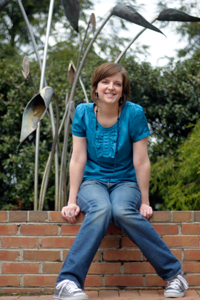Linguistics Undergraduate Student
Jessica Holman
"The Place Where Language and People Cross"
by Jessica Fisher
photos by Shaun Ring
If you think that linguistics is just about learning a bunch of different languages then, frankly, you have been misinformed. But don’t take it to heart—most people share this common misconception. Luckily, one of UK’s finest linguistics students, Jessica Holman, is able to clarify what the major really entails and why she is so proud of her eastern Kentucky roots, accent and all.
 Born in London, Ky., right in the foothills of Appalachia, Holman developed a love for language at an early age—her native Appalachian English, unique in its own right. After all there is Standard English, which Holman said, “we all need to learn so everyone can understand each other,” but which she also points out, “is normally different then the way people actually speak.” Her undergraduate research is broadly focused on sociolinguistics, which Holman defined as the grey area between linguistics and sociology—the place where language and people cross. Rather than studying language separate from the culture and the people that it is attached to, sociolinguists travel a bit further, beyond verbs, nouns and syntax, by looking at “how the language is affected by the culture and how the culture is affected by the language,” said Holman.
Born in London, Ky., right in the foothills of Appalachia, Holman developed a love for language at an early age—her native Appalachian English, unique in its own right. After all there is Standard English, which Holman said, “we all need to learn so everyone can understand each other,” but which she also points out, “is normally different then the way people actually speak.” Her undergraduate research is broadly focused on sociolinguistics, which Holman defined as the grey area between linguistics and sociology—the place where language and people cross. Rather than studying language separate from the culture and the people that it is attached to, sociolinguists travel a bit further, beyond verbs, nouns and syntax, by looking at “how the language is affected by the culture and how the culture is affected by the language,” said Holman.
After moving from London to Danville, Ky., she graduated from Boyle County High School in 1999, and then on to Berea College to pursue an English degree. However, to Holman’s surprise, she soon realized that studying English was more about the study of English literature and less about the actual language. It wasn’t until she entered the University of Kentucky that she found what she had been looking for all along. “I was excited when I found out UK offered linguistics—I’ve always been more interested in the grammatical side of English, the language itself and how it's actually used. “I learned there is no right or wrong in language,” she explained. “There is only what you can say and what you can’t say, what is acceptable to the listener, what they understand and what they don’t understand. If you get your point across—then it is not wrong.”
As a student of North and South American indigenous languages, Holman has also had to grapple with a sense of loss—the disappearance of language. “There are a lot of languages disappearing, native speakers are becoming fewer and fewer, and language documentation and revitalization is a huge issue in the field right now.” Preserving a culture’s language is of the utmost importance because “language can hold people together; it is something they definitely share.” And Holman noted that language is different than other cultural factors. “People might change the way they dress, change the way they live, but you can always speak the same language.” Furthermore, language is often lost in translation. What may exist in true form in one’s native language has a diluted meaning in another, and from a purely scientific standpoint, Holman suggested, “There could be millions of plants and animals (flora, fauna) that we haven’t discovered or identified yet in western science, but someone has a name for them, someone has seen them.”
 Language is a window into the unknown, the loss of it in any culture is detrimental to the next and the transparency of its roots harder to regain. Holman learned first-hand the importance of reviving endangered languages when she had the rare opportunity to take a K’iche’ class, part of the Mayan language family, taught by Rusty Barrett. “What solidified my interest in going on in the field, furthering my education and trying to really stay with it, was the K’iche’ class. We got to do field work in class with a native K’iche’ speaker (Manual Tahay Gomez) and work with him,” Holman proclaimed with excitement. “It was tiring and kind of scary and intimidating at first, but it was so much fun and that is the kind of experience that you have out in the field if you work as a linguist. How many undergraduates in other programs would get to do that?”
Language is a window into the unknown, the loss of it in any culture is detrimental to the next and the transparency of its roots harder to regain. Holman learned first-hand the importance of reviving endangered languages when she had the rare opportunity to take a K’iche’ class, part of the Mayan language family, taught by Rusty Barrett. “What solidified my interest in going on in the field, furthering my education and trying to really stay with it, was the K’iche’ class. We got to do field work in class with a native K’iche’ speaker (Manual Tahay Gomez) and work with him,” Holman proclaimed with excitement. “It was tiring and kind of scary and intimidating at first, but it was so much fun and that is the kind of experience that you have out in the field if you work as a linguist. How many undergraduates in other programs would get to do that?”
And the truth is, not many. UK’s linguistics program is the only one of its kind in the Commonwealth. Looking forward, Holman is on track to graduate in May 2010, and while she may move elsewhere to attend graduate school, ultimately she hopes her work in the field will bring her back home. “I am really interested in Appalachian English. So many people think if you’re from Kentucky there is a certain way you sound. People dismiss Appalachia and Kentucky—even people from our own state—as backwards and uneducated people, based completely on an accent,” Holman said. “Slowly but surely it feels like there is a movement among our culture and this country to not judge people based on one aspect or another, to not be prejudiced towards people on something that makes them unique, and I don’t think language should be separate from that.”
